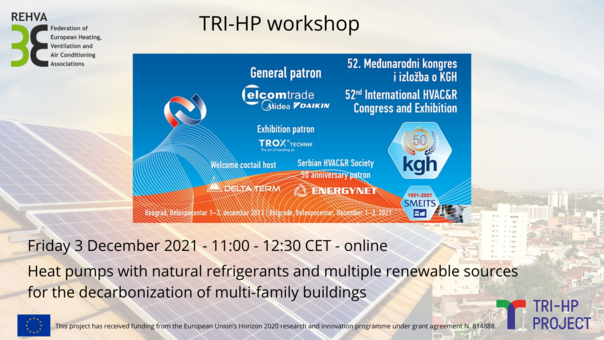REHVA was invited by SMEITS (REHVA’s member in Serbia) to participate with a workshop in the 52nd International HVAC&R Congress and Exhibition. The Congress is an annual event gathering experts and industry players across the entire value chain of HVAC&R industry and in 2021, it was organised as a hybrid event. Similarly to the 2020 version of the Congress this year REHVA participated with a workshop organised in the framework of the EU funded TRI-HP project.
In a nutshell, TRI-HP project develops trigeneration systems based on heat pumps with natural refrigerants and multiple renewable sources, to provide heating, cooling and electricity to multi-family buildings. These systems aim to generate 80% renewable energy, reduce overall costs by 15%, while cutting greenhouse gas emissions by 75% compared to gas powered systems.
The workshop opened by Spyridon Pantelis, REHVA’s Project & Technical Officer, by thanking SMEITS for the invitation and introducing the TRI-HP speakers.
The floor was then passed to TRI-HP project coordinator Daniel Carbonell, project manager at SPF Institute for Solar Technology, who introduced the main objectives of the project along with the two main innovative heat pump systems: dual source/sink system and solar-ice slurry one. He also presented the self-diagnosis algorithm, able to detect system performance losses and the advanced energy management system to ensure optimal operation of the overall system.
Raphael Gerber, development officer for Heim AG in Switzerland, presented some insights about the use and properties of various natural refrigerants, highlighting the key findings of experimental results from the application of CO2 and propane refrigerants in TRI-HP systems.
The dual-source heat pump system (geothermal/air) has been tested at Tecnalia’s climatic chamber in both cooling and heating modes. The experimental results were presented by Xabier Peña Anton, Senior Researcher in the area of Thermal Energy at Tecnalia R&D. He summarized the key findings of the laboratory tests, including the respective coefficient of performance (COP) of each tested system/mode.
In a rather non-technical tone but complementarily to the technological advancements above, Thomas Friedrich from Institute for Social-Ecological Research in Germany shed light on the social acceptance of heat pumps. He presented the outcomes of stakeholders’ interviews and national workshops that were held in Germany, Switzerland, Spain and Norway. He stressed out the importance of overcoming the identified challenges and barriers (e.g. high upfront costs, lack of technical expertise etc.) that currently hamper the market acceptance of innovative heating and cooling systems.
The workshop was rounded up with a 20 minute Q&A session, where the audience had the opportunity to make questions to the presenters. Some of the addressed topics were the additional red-tape for obtaining security permits when using flammable natural refrigerants (e.g. propane), the different standards that were used for testing the TRI-HP systems, and the potential application of supercooling method in other technological fields. In the closing remark by Dani Carbonell, it was highlighted the importance of flexible heating and cooling systems that will be also capable to supply flexibility to the grid – something that will make such innovative systems more efficient and more significant in the future energy grids.
Click here to download the slide decks
Click here to watch the workshop’s recording on YouTube

